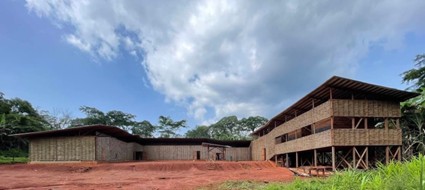Report on the Dispatch to Cameroon
Graduate School of Asian and African Area Studies, Kyoto University
Associate Professor
Hirokazu Yasuoka
I traveled to Cameroon from March 7 to 21, 2025. In a forested area in southeast Cameroon where hunter-gatherers called Baka live, I have been implementing the SATREPS Coméca project as a principal investigator from July 2018 to July 2024. This project is to create a management system for various non-timber forest products (NTFPs) and wildlife distributed in the rainforest in collaboration with the local people. The results of the Coméca Project have been continued in this study. Currently, I am conducting research for this project at a field station (Gribe/Zoulabot) of IRAD (Research Institute for Agricultural Development), which was the Cameroonian counterpart of the Coméca project.
After leaving Japan on March 7 and collecting materials at a library and bookstore in Paris on March 8, I arrived in Cameroon on March 9. The next day, they left the capital Yaounde and arrived in Gribe village on March 11. On March 12, together with IRAD researchers, we carried out a workshop and discussed how to utilize non-timber forest products at Gribe station, and demonstrated NTFPs processing formulated by IRAD and Kyoto University, where local people learned processing techniques.

We then moved on to the village of Zoulabot, where we visited the Baka camp from March 13-15 to observe and interview them about hunting, and to explain the wildlife management methods we are developing. We confirmed that the R/B monitoring concept (https://sites.google.com/kyoto-u.ac.jp/comeca/rb-monitoring), which is at the core of our management approach, is easily understood by the Baka. This wildlife management is concerned with how the hunting practices of the Baka will be reorganized in the context of changes in the ecological environment, such as declining animal resources, and in the social environment, such as the establishment of protected areas, and what kind of relationship the Baka children should create with the forest and animals in this context. Therefore, documenting and analyzing the process of implementing this management is highly suggestive of the issues involved in this project.

On March 17, we worked on the Zoulabot station. Specifically, we worked on the living space and set up the electrical and communication systems. On March 18, we departed for Yaounde, and on March 19, I started our flight back to Japan.

